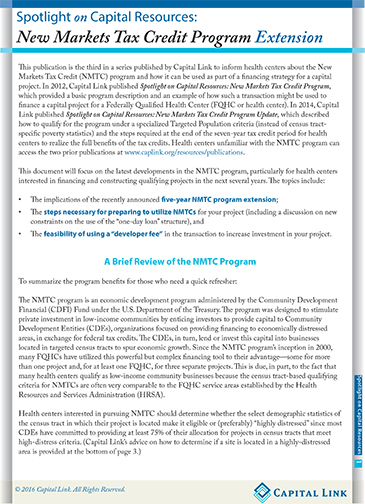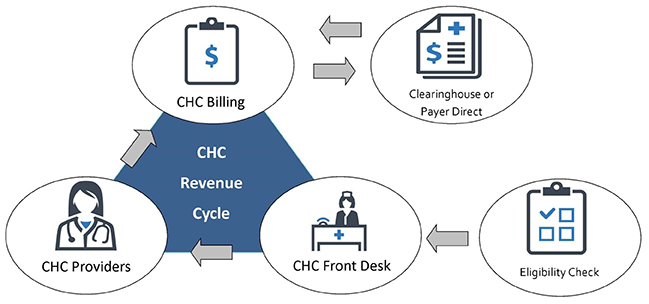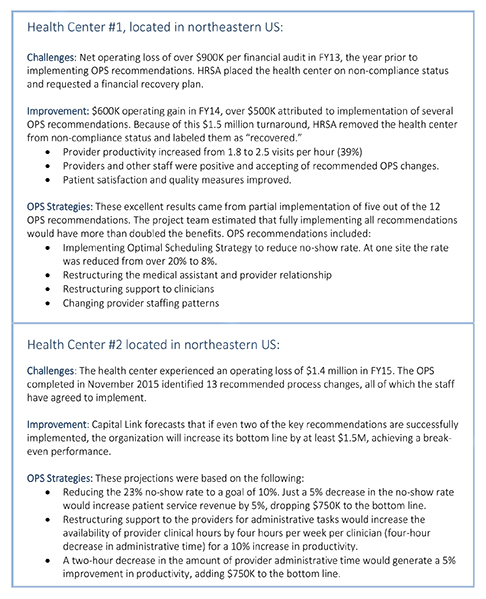New and Noteworthy
2015-2016 New Markets Tax Credit Program Allocation Awards − Are You Ready?
Under the New Markets Tax Credit Program (NMTC Program) changes announced by the Community Development Financial Institutions (CDFI) Fund last spring, we anticipate that the 2015-2016 tax credit allocation awards for Community Development Entities (CDEs) will be announced in the next few months—and that the award amounts will total $7 billion, an historic high for the program. As organizations focused on providing financing in economically-distressed areas, CDEs work to attract investors (primarily banks and large corporations) to provide them with capital in exchange for federal tax credits. CDEs, in turn, lend or invest this capital in businesses located in targeted census tracts, such as community health centers, to spur economic growth.
To help health centers take advantage of this opportunity, Capital Link has prepared a variety of new resources, described below:
 |
Spotlight on Capital Resources: New Markets Tax Credit Program Extension Webinar: Financing Health Center Projects with New Markets Tax Credits |
In addition to the new NMTC publication and upcoming webinar, we will once again be offering a New Markets Tax Credit Readiness Program, designed to assist health centers in accelerating their preparedness for NMTC financing. Through this program, we will be actively working with a select group of health centers that have projects that need financing within the next year. As a result of grant funding from our NMTC financing affiliate, Capital Fund, up to 10 health centers will be eligible to receive this assistance at reduced cost. To find out how Capital Link can help your health center capitalize on this financing option, please contact Jonathan Chapman, Director of Community Health Center Advisory Services at 970-833-8513 or This email address is being protected from spambots. You need JavaScript enabled to view it..
To learn more about the NMTC program and how it works, access all of our Spotlight on Capital Resources: New Markets Tax Credit Program resources here on our website.
Strengthening Health Center Performance through Effective Revenue Cycle Management
As health centers seek to stabilize and improve their financial and operational performance, the revenue cycle management (RCM) function is a critical area of focus. RCM is the process of capturing, managing, and collecting patient service revenue starting with appointment scheduling and ending with the final adjudication of the claim. Maximizing the efficiency of RCM can improve a health center’s cash flow by increasing collections (revenues) and decreasing costs (expenses) without negatively affecting clinical outcomes and patient satisfaction.
The FQHC Revenue Cycle

Source: Priority Management Group, Inc. (PMG) (2015). California Primary Care Association Revenue Cycle Management Program [PowerPoint slides].
While some health centers have the capacity and expertise to effectively manage the complex process of billing and collecting of patient accounts internally, other health centers find outsourcing RCM to industry experts to be a better solution. For some, the inability to find, hire, and retain qualified staff is the main driver of outsourcing RCM. For others, it is anticipated cost savings.
In response to health centers’ interest in better managing RCM, Capital Link has recently conducted several trainings and presentations on the topic, the most recent being Strengthening Health Center Collections through Effective Revenue Cycle Management at the NACHC CHI & EXPO. Content has included:
-
The impact of health reform on health center billing and collections, with best practices to respond.
-
Best practices and “on the ground” implementation strategies for improving health centers operational cash flow and financial viability.
-
How RCM and the billing process has changed as health centers move through Affordable Care Act implementation.
-
Which metrics to monitor and benchmark, what they mean, and the tools/reports available to help health centers assess their performance compared to industry standards to help them better manage and track the RCM function and improve its effectiveness.
-
What and how to calculate a denial rate and identify the factors that driving the figure and how to improve it.
-
How to optimize Electronic Medical Records and Electronic Practice Managements systems (EMR/EPM) and how it can affect financial statements.
To further address the challenges of RCM, Capital Link is currently developing tools and planning future trainings. We’d like to make the content as relevant for health centers as possible. We encourage you to submit any suggestions for content you may have. Please email us at This email address is being protected from spambots. You need JavaScript enabled to view it..
Improving Patient/Staff Satisfaction and the Bottom Line with Optimal Performance Services
Despite their best efforts, health centers face a myriad of challenges that can lead to net losses, frustrated providers, exhausted staff, and declining patient satisfaction. To help health centers break this cycle, Capital Link is collaborating with experts at HealthMETRICS to help health centers improve performance while increasing patient and staff satisfaction through a practice known as Optimal Performance Services (OPS).
OPS is an interactive process to help health centers understand the operational drivers of their performance, how their process of delivering care influences the drivers, and how specific interventions can lead to positive results. Newly customized for health centers, OPS is based on a strategy that has been successfully applied to more than 400 healthcare providers over the past 10 years. Past implementations have increased productivity by 20% or more, providing better access to care while improving patient and staff satisfaction and boosting operating margins. HealthMETRICS’ confidence in the results achieved through the OPS process is expressed through a guarantee that a client’s annual bottom-line benefit will far exceed the project costs. Having completed over 400 projects, this guarantee has never been challenged.
Below are two examples of health centers that have recently completed this process, part of a successful pilot program.

To learn more about OPS, visit our website or contact Mark Lurtz, Director of Partnership Development, at 636-244-3082 or This email address is being protected from spambots. You need JavaScript enabled to view it..
Thank You for Participating in Our National Capital Needs Assessment
We want to thank all of the health centers that participated in our national capital needs assessment. Your help in compiling this information is invaluable!
Results of this important assessment will:
-
Inform the development of new capital financing programs and technical assistance services—from which all health centers can benefit
-
Help identify the most effective strategies for health centers to secure capital funding to achieve their expansion goals
-
Help to educate capital funding sources and policy makers regarding the scale and types of health center capital needs and related funding requirements necessary to expand health center operations
A report with the results from this assessment will be available soon. You can access the results from our last national capital needs assessment, Capital Plans and Needs of Health Centers: A National Perspective, here on our website.
![]()

